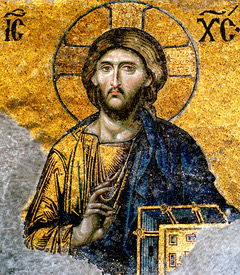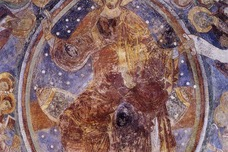Sunday Reflection with Canon Robin Gibbons: 18th August 2025

Hagia Sophia Icon
Twentieth Sunday in Ordinary Time
I was listening carefully to an American broadcast in which one of the hosts, having declared that she was an atheist, proceeded to lecture the audience on the evil nature of religion and cited Christianity as one of the major causes of conflict and war. Now in listening to this diatribe I found far too many inaccurate statements were left unchallenged, most were exaggerated in order to underline her point about the hypocrisy in religions.
She has a point. Religion, Christianity included, does not have a great track record of peace. That record is blemished even more for us amongst our own variety of Christian Churches and denominations, and to be honest we are hypocrites, even if unknowingly, because we make many compromises over aspects of our ethical and moral life.
But I am not going to subscribe to any hard line Christianity, we are a Church of many nations, races and peoples, with many different cultural ways of expressing and living out our faith, what we need to pray for is patience with difference, openness to others and tolerance for situations we do not fully understand, all rooted in mercy. For we are as St John Henry Newman pointed out a people whose route to perfection is to change often!
I certainly recognise that my own faith has these hypocritical or perhaps ambiguous elements in it. I subscribe to discipleship of Christ but acknowledge that far too often either I don't see the whole picture or ignore things I do not wish to notice. And sin is there too, the human quality of being somebody with feet of clay. I am also aware that religion, faith in the real world, can often bring conflict between those of good faith. I had a very difficult time when I decided that my vocation was to the monastery and in time become a priest, I cannot say that the prevailing wind in my life at that time was a warm breeze encouraging me onwards, there were arguments, people who thought this choice a 'waste of time' or gave me every objection to the monastic way of life, despite the negativity in the end it served to make me choose with eyes open, for those who challenged me were good people, and their opposition led me to understand and view monastic life not as a way of perfection but as a route towards it.
In fact a lot of my early monastic life, besides being a difficult spiritual journey that has lasted until now, was also tough in physical terms, so these words from a verse the letter to the Hebrews just beyond the ones in our Sunday reading ring so very true:
'for whom the Lord loves, he disciplines;
he scourges every son he acknowledges.' (Heb 12:6) And yet, harsh though it may sound, it is done with love and mercy not anger.
We are not in an age where harsh discipline is seen as part and parcel of growing up, and in our Christian faith we seek the gentler tones of Jesus to help us. It is true the great articulators of doom tend to really put one off religious faith, but the story of `Jeremiah ought to remind us that occasionally hard stuff happens, tough talk is necessary if we are to remain true to the ethical path of God. We might discover that the penalty for drawing peoples attention to what is wrong, evil and destructive in human existence-will result in the statement Jesus describes in todays gospel:
'Do you think that I have come to establish peace on the earth?
No, I tell you, but rather division'. (Lk 12: 51)
This type of division is not intended to become a war, but to make us draw a line in the ethical sands of life. Christ's words and commands are for life, a life in need of constant transformation, in which each one of us not only measures ourselves against the Beatitudes, but soaks ourselves in a relationship with the Holy One. This is why I do not disagree with that American TV host stating that religions cause war, but would want to point out it is not the fault of religion but of each one of us. I would opine that far more conflicts in the history of our planet have been caused by our greed, arrogance, cruelty and ego centeredness and has had little to do with any religious belief.
That does not excuse us whose faith is based on the command to love God and our neighbour as ourselves, but the words of Jesus in our Gospel today makes it clear that to set the world on fire, even a fire of love, will also mean some will get burnt or hurt. What then shall we do? I believe the words of Hebrews give us the answer this day:
'Therefore, since we are surrounded by so great a cloud of witnesses, let us rid ourselves of every burden and sin that clings to us* and persevere in running the race that lies before us while keeping our eyes fixed on Jesus, the leader and perfecter of faith'. (Heb 1,2a)
Lectio
Hans Kung
The Church
The church must change even more to remain itself. And it will remain what it should be if it remains with the one who is its origin; if in all its progress and change it remains faithful to this Jesus Christ. It will then be a church which is closer to God and at the same time closer to men and women. Then the Catholics with their emphasis on tradition will become more evangelical and at the same time the Protestants with their epnasis on the gospel will become more catholic, and in this way - and this is decisive - both will become more Christian. (page 230)
Hans Kung speaking at Karl Barth's memorial
Kung spoke with affectionate admiration at Barth's memorial service, and comments in his latest Memoir volume:
Now the theologian who could point to an incomparable theological oeuvre has returned to his God. And I remember the moving moment when he told me that if ever he had to go before his God he would not refer to his many 'works' not even to his 'good faith', but simply say, 'God be merciful to me, a poor sinner'. I do not doubt for a moment that he has been received graciously.
Karl Barth
Jesus does not give recipes that show the way to God as other teachers of religion do. He is himself the way.


















